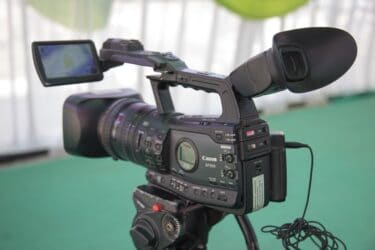 CourtScribes is the number one company in America when you are looking for a stenographer. A stenographer is one who is trained to type or write in shorthand methods, enabling them to write as quickly as people speak.
CourtScribes is the number one company in America when you are looking for a stenographer. A stenographer is one who is trained to type or write in shorthand methods, enabling them to write as quickly as people speak.
Stenographers create long-lasting documentation of everything from court cases to medical conversations. This is useful in many legal settings. The skill is also used for live closed captioning on television or captioning for hard-of-hearing audiences at events.
What Does Stenographer Mean?
The word “stenography” comes from the Greek “steno” meaning narrow and “graphy” meaning writing. So stenography equals “narrow writing”.
Modern-day stenographers use shorthand typing machines called stenotypes. These machines allow stenographers to type at rates exceeding 300 words per minute. An average talking speed is about 150 words per minute. This incredible rate of writing lets a high-quality stenographer keep up with complex conversations, even when multiple people may be speaking in a court or event setting.
How Does Stenography Work?
Today’s stenographers use stenotype machines that enable shorthand writing. These stenotype machines work by typing in syllables rather than letters. By pressing three keys at once (called a “chord”), they can make the syllable “cal”, then “en” and “dar”. In the time it takes us to type three individual letters, a stenographer can type an entire word on their stenotype.
Because of this condensed form of typing, a stenotype keyboard has only 22 keys. This is opposed to normal computer keyboards, which have between 70 and 105 keys. The stenotype can be so condensed because of the chord system — by combining keys you have hundreds of combinations to make different syllables quickly.
What are the Differences Between Stenographers and a Court Reporters?
Let us first note that all court reporters are stenographers, but not all stenographers are court reporters.
Stenographers can offer services as medical transcriptionists, real-time TV captioners, as well as in numerous accessibility fields (think transcribing voice calls for deaf users). These stenographer services are widely varied in difficulty and importance of accuracy.
Court reporters are specialized, highly trained stenographers. Their extra training and certifications make the documents they create admissible as evidence in court.
It is crucial that a court reporter be completely accurate in their shorthand typing, so no important words or phrases are missed that could make or break an attorney’s case. Additionally, court reporters must learn an entire set of legal vocabulary and processes that they will use in the courtroom, all while navigating the stenotype machine that has been compared to using an instrument and a foreign language at the same time.
Stenographer vs Digital Court Reporting
In today’s digital age, it is easy to think that stenography should already be replaced by digital recording and AI transcription of recorded words. Eventually, this will probably be the case.
A more viable replacement for stenographers that is already being used in some courtrooms is digital court reporting. Rather than paying a highly trained stenographer to work a complex stenotype machine, courtroom proceedings are simply recorded as digital audio, then after the proceeding, a less trained typist transcribes the record at a slower pace.
The problem that many digital court reported records run into is the inaudible moments. Often a microphone will sizzle or a witness moves away from the microphone, resulting in difficult-to-hear and impossible-to-transcribe moments on the record. In high-stakes criminal justice, this can have a massive impact. A live stenographer has better hearing and can ask for a statement to be repeated if they miss a few words.
While digital options are certainly going to eat into the job market for stenographers (market sources anticipate the number of jobs to slow), there is still an anticipated shortage. The average age of stenographers is well into their fifties, and in the next ten years, the retirement wave is expected to create a shortage of stenographers. This makes stenography a very viable career even as the industry becomes increasingly digital.
If you need court reporting services that handle digital recording then CourtScribes.com which supports all states and programs that aid in the court reporting world are ready to serve you in your court reporting, videography services, interpreters, live-streaming, and video-to-text synchronization.
Although the majority of cities that offer CourtScribes’ services are in Florida, the company home base, other cities all across these United States that CourtScribes offers services in, are the following: Jacksonville, Miami, Tampa, Port St. Lucie, Fort Lauderdale, Cape Coral, Coral Springs, Clearwater, Palm Bay, Fort Myers, Weston, Sarasota, Orlando, St. Petersburg, Hialeah, Stuart, Hollywood, Naples, West Palm Beach, Boca Raton, Deerfield Beach, Jupiter, Key West, Coral Gables, Maryland, Manhattan, Buffalo, Washington DC, Baltimore, Bowie, Virginia, Frederick, Albany, New York, Brooklyn, Westchester, Gaithersberg, and Rockville.
 Stenography is one of the most identifiable methods of recording the spoken word. Stenographers have been a familiar sight in courtrooms for the better part of the past centuries. Stenography, in short, is the act of recording spoken words through shorthand using a stenotype machine.
Stenography is one of the most identifiable methods of recording the spoken word. Stenographers have been a familiar sight in courtrooms for the better part of the past centuries. Stenography, in short, is the act of recording spoken words through shorthand using a stenotype machine.
 You probably already are well familiar from this site that court stenographers are people trained to type and write in shorthand, which allows them to write as fast as people can speak. It is believed that 180 Words Per Minute is the ‘speed of speech’. Stenographers document and record everything that takes place in the courtroom. This makes them an integral part of court hearings across the world. In this article, we are going to break down what stenography is, and explain why it is important in law.
You probably already are well familiar from this site that court stenographers are people trained to type and write in shorthand, which allows them to write as fast as people can speak. It is believed that 180 Words Per Minute is the ‘speed of speech’. Stenographers document and record everything that takes place in the courtroom. This makes them an integral part of court hearings across the world. In this article, we are going to break down what stenography is, and explain why it is important in law. As
As 